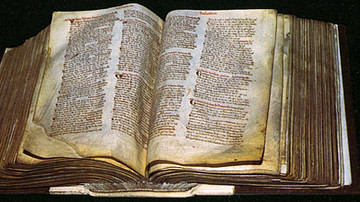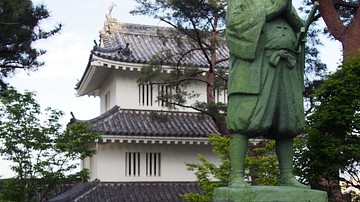Search
Search Results

Image
Egyptian Model of Peasants Ploughing
Model of peasants ploughing from Egypt. 11th or 12th Dynasty, c. 2025-1850 BCE.
The British Museum, London.

Definition
Knights' Revolt
The Knight’s Revolt (1522-1523) was a military action led by the German imperial knight Franz von Sickingen (l. 1481-1523) and encouraged by the knight and writer Ulrich von Hutten (l. 1488-1523) launched to restore the status of the imperial...

Article
Causes of the Russian Revolution of 1917
There were many causes behind the Russian Revolution of 1917, ranging from the unpopular authoritarian rule of Tsar Nicholas II (reign 1894-1917) to the radical mobilisation of the working class, who wanted better working conditions and more...

Definition
Russian Revolution of 1905
The Russian Revolution of 1905 challenged the absolute power of Tsar Nicholas II (reign 1894-1917) as ruler of the Russian Empire. Bloody Sunday in 1905 started the year disastrously for the tsar when soldiers fired upon an unarmed crowd...

Definition
Bolshevik Revolution - When Russia Became a Socialist State in 1917
The Bolshevik Revolution occurred on 7 November 1917 (old calendar 25 October) and established a new republic: Soviet Russia. The Bolsheviks were radical socialists led by Vladimir Lenin (1870-1924), whose goal was a fairer society where...

Article
Müntzer's Vindication and Refutation
The Vindication and Refutation of Thomas Müntzer (l. c. 1489-1525) is a 1524 open letter to Jesus Christ, Martin Luther (l. 1483-1546), and the Christian community charging Luther with hypocrisy, betraying his original vision to win support...

Article
Peasant Life in a Medieval Manor - The Family of Bodo, Carolingian Farmers
Bodo was a early 9th-century Frankish farmer. He and his family hailed from a manor owned by the monastery of St.-Germain-des-Prés near Paris and worked as its tenants. He ploughed the farmlands while his wife, Ermentrude, took care of their...

Definition
Domesday Book
Domesday Book was a comprehensive survey and record of all the landowners, property, tenants and serfs of medieval Norman England. It was compiled in 1086-7 under the orders of William the Conqueror (r. 1066-87). The record is unique in European...

Definition
Shimabara Rebellion
The Shimabara Rebellion was a peasant uprising that occurred from 17 December 1637 to 15 April 1638 in Japan's southern island of Kyushu. Economic desperation, famine, and religious persecution led the peasants of the Shimabara peninsular...

Definition
Serf
Medieval serfs (aka villeins) were unfree labourers who worked the land of a landowner (or tenant) in return for physical and legal protection and the right to work a separate piece of land for their own basic needs. Serfs made up 75% of...